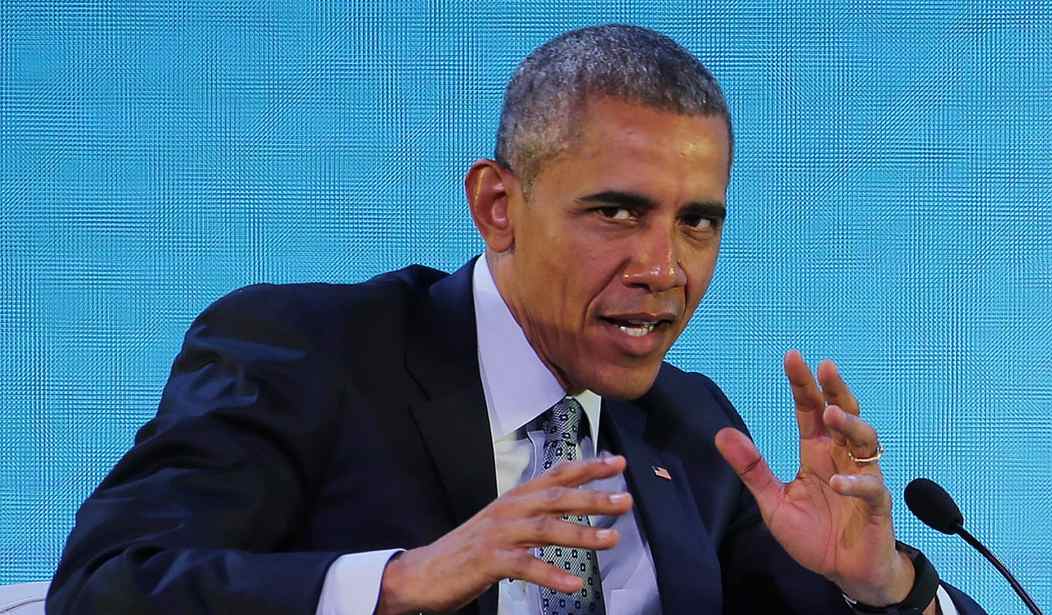When President Obama told George Stephanopoulos only hours before the Paris attack that his administration had “contained ISIS” he may have been wrong but he may also have been, in his own way, sincere in his belief that he would face no more major trouble from them.
“I don’t think they’re gaining strength,” Obama said of ISIS. “What is true, from the start our goal has been first to contain and we have contained them. They have not gained ground in Iraq and in Syria they’ll come in, they’ll leave. But you don’t see this systemic march by ISIL across the terrain.”
“What we have not yet been able to do is to completely decapitate their command and control structures. We’ve made some progress in trying to reduce the flow of foreign fighters and part of our goal has to be to recruit more effective Sunni partners in Iraq to really go on offense rather than simply engage in defense,” the president said.
Rarely has such a group been so rhetorically attacked but left so physically untouched as ISIS. As Shane Harris of the Daily Beast notes, the Islamic State’s capital of Raqqa, though seedy, has largely escaped widespread destruction. The “massive” French airstrike on Raqqa following the Paris massacre consisted of 20 strikes, and hardly any before that.
Of the 1,772 coalition strikes conducted inside Syria since the air campaign began, only 146 have been by nations other than the United States, France being one of the eight nations.
Assuming that each of those eight countries are contributing evenly, France conducted an estimated 18 strikes before Sunday in Syria. That’s only an approximation, of course. And it is unclear how many of those 146 strikes were in Raqqa, but a U.S. defense official told The Daily Beast the last French strike in that city was Oct. 8. (The only other publicized French strikes were on Sept. 27 and Nov. 10.)
This tally of strikes illustrates how central the US is to the entire Western effort against ISIS. If America does comparatively little the allies do even less. France was hardly doing its worst. It still isn’t. Before the Paris attack the French airplanes, like the more numerous American ones were like cops, looking for a man with a name: in this case, Salim Benghalem,AKA the “chief executioner” of ISIS who intel suggested might be found in a certain place which the Armée de l’air could conveniently bomb.
Benghalem, 35, grew up in the Paris suburb of Cachan. U.S. counterterrorism authorities have called him a chief “executioner” for ISIS, and French officials have linked him the group’s brutal enterprise of kidnapping, jailing, and killing Western journalists and aid workers.
Since he was thought to be the likely mastermind of any threat to Paris, when the French jets struck on Nov 8 with their low-yield BLU-126 low-collateral damage, de-rated JDAMs the Hollande government must have breathed a sigh of relief, as the New York Times reports:
French officials said American security services had alerted them in September to vague but credible information that French jihadists in Syria were planning some type of attack.
That tip, the officials said, contributed to France’s decision to launch what it had hoped might be pre-emptive airstrikes on Oct. 8 against the Islamic State’s self-declared capital in Syria, Raqqa, where France struck with a new and far larger round of airstrikes Sunday night — this time in retaliation.
Subsequent events illustrated how wrong the French and Obama had been. It also showed the limits of their approach. While the head-hunting drones and aircraft might keep the weeds down in Syria and somewhat geographically contain the Islamic State they proved unable to seal up its ideas, infiltrators and secret agents. Those had traveled to Europe via the Internet, the mosques, commercial air travel and the migrant trail.
It is now believed the Paris attack was launched from a suburb of Brussels called Molenbeek, to which nearly every terrorist attack in Europe has been linked, and over which the Belgian interior minister claims no control. At least some of the attackers were furnished from the ranks of refugees streaming in from Syria. The planning itself may have used the chat feature of Playstation 4, which the French sleuths had not thought to tap. To use a medical analogy, the threat has metastized and spread beyond the region of preventive surgery.
The result was the failure of Obama’s containment. French officials now think the true mastermind wasn’t Benghalem at all but a 27 year old Belgian national named Abdelhamid Abaaoud. The cancer was not only in an unsuspected location, it had spread through vectors they hardly believed possible.
The much publicized commitment of 60 “commandos” to the Syrian fight and the recent Kurdish success against Sinjar may have persuaded president Obama he had adequately barricaded the Islamic state, but the attack on Paris emphatically proved it had easily escaped his one dimensional containment vessel. Greg Jaffe and Missy Ryan of the Washington Post wrote that some experts believed Obama’s slow-motion campaign against ISIS, was always one step behind the enemy and gave them too much time to adapt.
The horror in Paris, coming just weeks after the downing of a Russian jetliner in Egypt, underscores the risks of a strategy that relies heavily on local forces to defeat the Islamic State with American backing.
The core of President Obama’s strategy is using U.S. military air power to contain and degrade the Islamic State until local forces are ready to take the fight to the group. It’s an approach that acknowledges the president’s reluctance to be drawn into another major ground war in the Middle East and his belief that U.S. military power can’t by itself secure a lasting victory in Iraq and Syria.
The Paris attacks suggest that the Islamic State and its affiliates may have a broader reach and pose a deadlier threat to the West than intelligence officials and the Obama administration had previously believed to be the case.
Just hours before coordinated teams of gunmen killed more than 120 people in Paris, Obama, in an interview with ABC News, described the campaign against the Islamic State as a “multi-year project” that had succeeded in its initial goal of containing the group.
The Paris attacks could force the president to adopt a strategy that is more focused on destroying the group’s global reach beyond Iraq and Syria.
Slow it had been. For all the rhetorical fire directed against ISIS, from the denunciation of its massacres, outrages and cruelty, it has not been heavily hit. Its capital Raqqa, while worn out, still proceeds much as normal, unmarked by the damage and ruin which has overtaken so much of Syria, as this Wall Street Journal video shows. The bridge over the Euphrates which until lately supplied much of the city was knocked out only on November 5, 2015 — and by the Russian aircraft to boot — a testament to how careful Obama’s campaign has been.
But if there was outward administration confidence that the Obama strategy was working, there is now inner doubt. The clearest sign that professional strategists were once again being heeded was the surprising return of an updated version of World War 2 oil campaign. Obama has finally authorized the air force to bomb the oil resources that provide ISIS with money. It is a reprise of the 8th Air Force campaign than throttled Nazi Germany.
ERBIL, Iraq — The United States and its allies have sharply increased their airstrikes against the sprawling oil fields that the Islamic State controls in eastern Syria in an effort to disrupt one of the terrorist group’s main sources of revenue, American officials said this week. …
While the American-led air campaign has conducted periodic airstrikes against oil refineries and other production facilities in eastern Syria that the group controls, the organization’s engineers have been able to quickly repair damage, and keep the oil flowing, American officials said. The Obama administration has also balked at attacking the Islamic State’s fleet of tanker trucks — its main distribution network — fearing civilian casualties.
But now the administration has decided to increase the attacks and focus on inflicting damage that takes longer to fix or requires specially ordered parts, American officials said….
The new operation is called Tidal Wave II, named after Operation Tidal Wave, the World War II campaign to hit Romania’s oil industry and thus hurt Nazi Germany. Lt. Gen. Sean B. MacFarland, who in September became the commander of the international coalition’s effort in Iraq and Syria, came up with the name.
Much of the initial targeting was done in South Carolina at Shaw Air Force Base, which has become a leading symbol of the military’s ability to carry out global operations from afar.
This sudden openness to new approaches can only come from fear. Now Obama’s resistance to targeting oil trucks has also weakened. Another New York Times article reports that the Air Force is allowed to hunt trucks, and reportedly destroyed 116 only yesterday.
intensifying pressure on the Islamic State, United States warplanes for the first time attacked hundreds of trucks on Monday that the extremist group has been using to smuggle the crude oil it has been producing in Syria, American officials said.
According to an initial assessment, 116 trucks were destroyed in the attack, which took place near Deir al-Zour, an area in eastern Syria that is controlled by the Islamic State.
The airstrikes were carried out by four A-10 attack planes and two AC-130 gunships based in Turkey.
It may not be enough, but it’s a start. Since assuming office in 2009, president Obama has pursued a policy of buying off the grievances of Islamism, probably in the sincere belief this would work better in the long run than resisting it. “I recognize that Barack Obama does not wish to defend this country,” was the way Senator Ted Cruz put it in the aftermath of the Paris attack. “He may have been tired of war, but our enemies are not tired of killing us. And they’re getting stronger.”
The Senator from Texas may be too harsh in his criticism. In truth, much of the Western elite thinks like the president. Like the politicians and Brussels, Obama may have truly believed the PC universe was the wave of the future, and may still believe it, however badly it is falling apart. During the recent Democratic Party presidential debate, nearly every candidate promised to fight a sort of generic extremism — which ISIS would not recognize, but which is on the lips of every college campus in America.
The goal may now be to salvage failed policy by doing its opposite, thereby allowing it to claim some success. There is no choice. With his vaunted containment falling apart, Obama must do something. Even he can’t let Paris burn. Rather than ending two wars, his term is finishing on a bleak scene of destruction covering the whole Middle East and North Africa to which has been added conflict in Ukraine, a flashpoint with China and the specter of urban warfare in Western Europe.
The challenge is how to portray this as victory. While it is too much to expect the Western elite to admit error, it seems likely that reality may force them to modify positions out of sheer necessity. The administration will probably finish out its term stumbling from one crisis to the other, in an ad hoc attempt to cope with unanticipated challenges made all the more surprising by being unthinkable in their universe.
Follow Wretchard on Twitter
Recently purchased by readers:
Opposable Mind, Winning Through Integrative Thinking Kindle Edition by Roger L. Martin
The Blind Side, Evolution of a Game Kindle Edition by Michael Lewis
A Vietcong Memoir, An Inside Account of the Vietnam War and Its Aftermath Paperback by Troung Nhu Tang
Destiny Betrayed, JFK, Cuba, and the Garrison Case by James DiEugenio
The Global Offensive, The United States, the Palestine Liberation Organization, and the Making of the Post-Cold War Order (Oxford Studies in International History) by Paul Thomas Chamberlin
SJWs Always Lie, Taking Down the Thought Police Kindle Edition by Vox Day
Possibly worth buying:
The Survivor (A Mitch Rapp Novel), Hardcover by Vince Flynn, Kyle Mills
Rosemary, The Hidden Kennedy Daughter Hardcover by Kate Clifford Larson
The Good Dinosaur, Little Golden Book (Disney/Pixar The Good Dinosaur) by Bill Scollon, Michaelangelo Rocco
Disciples, The World War II Missions of the CIA Directors Who Fought for Wild Bill Donovan Hardcover by Douglas Waller
The Crossing (Bosch), Hardcover by Michael Connelly
Did you know that you can purchase some of these books and pamphlets by Richard Fernandez and share them with you friends? They will receive a link in their email and it will automatically give them access to a Kindle reader on their smartphone, computer or even as a web-readable document.
The War of the Words for $3.99, Understanding the crisis of the early 21st century in terms of information corruption in the financial, security and political spheres
Rebranding Christianity for $3.99, or why the truth shall make you free
The Three Conjectures at Amazon Kindle for $1.99, reflections on terrorism and the nuclear age
Storming the Castle at Amazon Kindle for $3.99, why government should get small
No Way In at Amazon Kindle $8.95, print $9.99. Fiction. A flight into peril, flashbacks to underground action.
Storm Over the South China Sea $0.99, how China is restarting history in the Pacific
Tip Jar or Subscribe or Unsubscribe to the Belmont Club









Join the conversation as a VIP Member